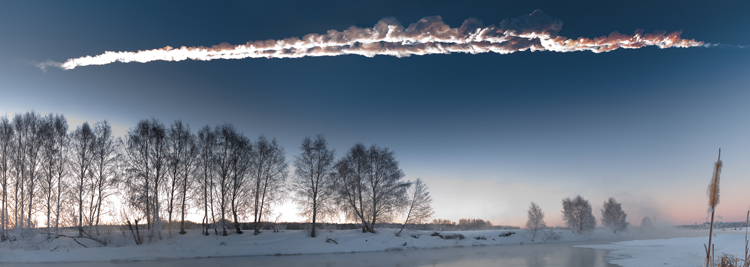If a Meteor Falls to Earth But No One Is There to Hear It, Does It Make a Sound?
Thursday, February 25th, 2016February 25, 2016
On February 6, a large fireball fell toward Earth and exploded in the atmosphere. Fortunately, it exploded over the Atlantic Ocean, some 600 miles (970 kilometers) off the coast of Brazil. Had it disintegrated over a populated area, it could have caused many injuries and deaths.

This photograph shows the Chelyabinsk meteor streaking through the sky above Chelyabinsk, Russia, on Feb. 15, 2013. The small asteroid was about 56 to 66 feet (17 to 20 meters) wide. Credit: M. Ahmetvaleev/NASA/JPL-Caltech
A meteor is a streak of light that appears in the sky. The brightest meteors are known as fireballs or bolides. A meteor appears when a piece of matter enters Earth’s atmosphere from space at high speed. Such a piece of matter is called a meteoroid. Most meteoroids that cause visible meteors are smaller than a pebble. As the meteoroid collides with the air, it is heated so that it glows, creating a shining trail of hot gases. Most meteoroids break apart in a second or less. Some fireballs explode as they descend through the atmosphere, sending powerful shockwaves toward Earth.
The February 6 fireball was the largest to reach Earth since the Chelyabinsk meteor exploded over southeastern Russia almost exactly three years earlier. That fireball passed over the city of Chelyabinsk and was recorded on video by dozens of people, giving scientists and the public alike a detailed view of the strike. The shockwave from the explosion damaged thousands of buildings and injured over 1,500 people, mostly with flying glass from broken windows. Scientists think the meteoroid was about 65 feet (20 meters) across and weighed more than 11,000 tons (10,000 metric tons).
An even larger bolide fell in the Tunguska River region of central Russia in 1908. Exploding over a forested area, the blast flattened thousands of trees and damaged the few structures in the area. Because it struck in such a sparsely populated region, only a few injuries and no deaths were reported.
Scientists are studying these strikes to improve their ability to detect potential meteoroids that could threaten major population centers on Earth. Researchers are also investigating ways to destroy would-be meteors or alter their paths.
Other World Book articles


